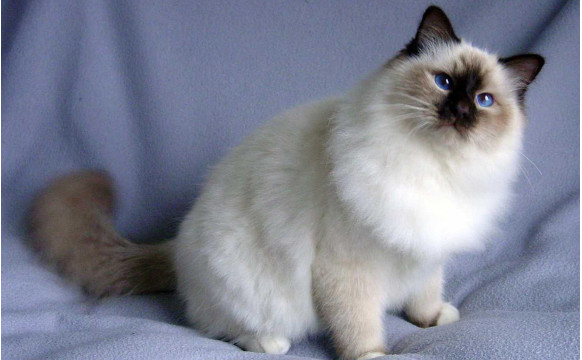History and Origins
The Birman cat, also known as the Sacred Cat of Burma, is surrounded by legend and historical intrigue. According to ancient lore, these cats were revered in Buddhist temples in Burma (now Myanmar) and were believed to carry the souls of departed priests. The goddess Tsim-Kyan-Kse, symbolized by a golden statue with sapphire eyes, was worshipped in these temples. The transformation of a temple cat named Sinh during the death of a priest led to the iconic Birman appearance: a golden coat, dark points, and white paws.
In more modern history, the breed’s documented origin begins in 1919 when a pair of Birman cats arrived in France under mysterious circumstances. Two stories exist: one involving a rescue by Westerners, Auguste Pavie and Major Gordon Russell, and another where a Mr. Vanderbilt purchased the cats from a temple servant. The male cat died during the journey, but the female, Sita, arrived pregnant, laying the foundation for the European Birman breed.
The breed was officially recognized in France in 1925, but World War II nearly wiped out the breed, reducing it to a single pair. Through careful outcrossing, the breed was reestablished and recognized in Britain in 1966 and the United States in 1967. Today, the Birman is a beloved breed known for its beauty and gentle temperament.
Physical Characteristics
Birmans are medium to large-sized cats with a robust yet elegant build. They are known for their unique color points, striking blue eyes, and white “gloves” on their paws. Here are some detailed physical traits:
- Coat: Silky and semi-longhaired, with a texture that is less prone to matting. The coat color is typically lighter on the body with darker points on the ears, face, paws, and tail.
- Eyes: Deep sapphire blue, which is one of the most captivating features of the breed.
- Paws: The front paws feature white gloves that ideally end at or between the second and third joints of the paw, while the back paws have gloves that may extend higher, ending in “laces” on the back of the hock.
- Body: Muscular with a sturdy frame, yet graceful in movement.
The symmetrical gloves and laces are highly prized in show cats, and breeders strive to perfect these traits, though the gene governing the white spotting factor is notoriously difficult to control.
Personality and Temperament
Birmans are known for their affectionate and gentle nature. They form strong bonds with their human companions and are often described as social and people-oriented. Key personality traits include:
- Affectionate: Birmans are loving cats that enjoy being close to their owners. They often seek out attention and companionship.
- Gentle: Their calm and docile temperament makes them ideal for families and individuals alike. They are typically good with children and other pets.
- Intelligent: These cats are smart and curious, often exploring their environment and engaging in interactive play.
- Sociable: Birmans are known to greet visitors with curiosity rather than fear, making them welcoming and friendly companions.
Their combination of affectionate, gentle, and intelligent traits makes Birmans easy to handle and care for, and they adapt well to various living environments.
Care and Maintenance
Birmans are relatively low-maintenance compared to other long-haired breeds, but they still require regular care to keep them healthy and happy. Here are some essential care tips:
- Grooming: Regular brushing is necessary to maintain their silky coat and prevent matting. A weekly grooming session is usually sufficient.
- Diet: A balanced diet rich in high-quality protein is important to maintain their muscular build and overall health. Consult with a veterinarian for specific dietary recommendations.
- Exercise: While Birmans are not as hyperactive as some breeds, they do enjoy play and exercise. Interactive toys and regular playtime help keep them mentally and physically stimulated.
- Health Check-ups: Regular veterinary check-ups are essential to monitor their health and address any potential issues early on. Dental care is particularly important to prevent periodontal disease.
Health Considerations
Birmans are generally healthy cats, but they can be prone to certain genetic conditions. Regular veterinary care and a healthy lifestyle can mitigate many of these risks. Some common health concerns include:
- Hypertrophic Cardiomyopathy (HCM): A heart condition that affects many cat breeds, including Birmans. Regular screenings can help detect and manage this condition.
- Feline Infectious Peritonitis (FIP): A viral disease that can be fatal. Vaccination and preventive care are crucial.
- Periodontal Disease: Regular dental check-ups and cleanings are important to prevent dental issues.
Breeding and Population
Breeding Birmans requires careful attention to maintain their distinctive traits and health. Responsible breeders focus on genetic diversity to prevent inbreeding and ensure the overall well-being of the cats. The breed’s population has grown since its near-extinction during World War II, thanks to dedicated breeding programs.
Birman Cats in Popular Culture
Birmans have made their mark in popular culture, often featured in films, books, and advertisements due to their striking appearance and gentle nature. Their storied history and captivating looks make them a favorite among cat enthusiasts and breeders.
Choosing a Birman Cat
If you’re considering adding a Birman cat to your family, it’s important to choose a reputable breeder. Here are some tips:
- Research: Learn about the breed’s characteristics, care requirements, and potential health issues. Understanding the breed will help you make an informed decision.
- Visit Breeders: Visit breeders in person to see their cats and facilities. A reputable breeder will be transparent about their breeding practices and happy to answer your questions.
- Ask for Health Records: Ensure that the breeder provides health records for the kitten and its parents. This information is crucial for understanding the cat’s health background.
- Consider Adoption: While purebred kittens from breeders are common, don’t overlook adoption. Many Birmans end up in shelters or breed-specific rescues in need of a loving home.
Conclusion
The Birman cat is a breed steeped in legend and history, with a unique combination of beauty and personality that makes it a favorite among cat lovers. Their affectionate, gentle nature and striking appearance make them ideal companions for a variety of households. Whether you’re looking for a quiet companion to share your home or a show-stopping pet with an air of elegance, the Birman cat is an excellent choice.
By understanding their history, physical characteristics, and care needs, you can provide a loving and supportive environment for these magnificent cats. In doing so, you’ll not only enjoy the companionship of a Birman but also contribute to the ongoing preservation and appreciation of this remarkable breed.
For more information and resources, visit the original article on Birman Cat Breed.

